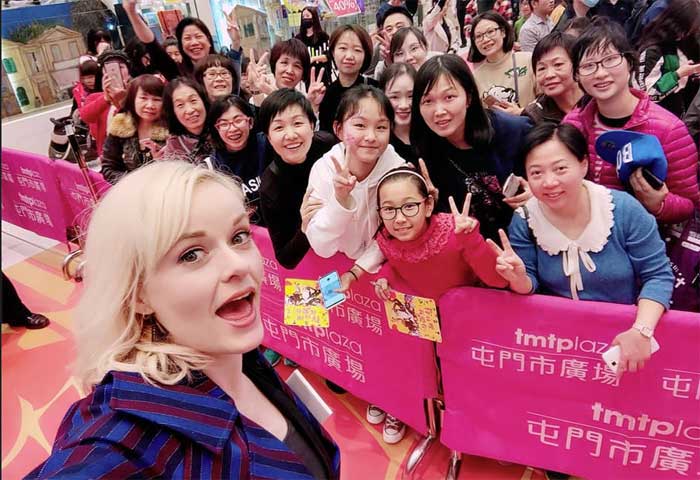You might find Hong Kongers singing in English, but it is not common to see a Western artist singing in Chinese. Celine Dion may be one of the few Westerners that have tried. Her performance during Chinese New Year attracted 700 million people fascinated by the idea of watching the Canadian diva singing a famous Chinese folk song in Mandarin on China's state-run CCTV.
While Dion's appearance may have been a one-off event, there's a Western singer in Hong Kong named
Corinna Chamberlain
- aka Chan Ming Yan - who is fully committed to having a career in one of the city's most famous exports, Cantopop (Cantonese popular music.)
But it is not only her looks what differentiates her from other Cantopop artists. The opening line of her song "Yi Jung" is like no other Cantopop. She sings that she feels like an "Alien from Mars" who has landed on Earth.
"In a body with this skin color," she continues, "I'm not quite like them. In fact, what kind of race am I?"
"Yi Jung" translates as "Different Breed" and Chamberlain herself is a different breed of Cantopop herself.
Born to parents from Australia and New Zealand, she is white, blue-eyed, and has long, curly blonde hair. Unlike most Westerners in Hong Kong, she grew up in a remote part of the region, far from any expat enclave. She attended local schools and speaks fluent Cantonese.
Growing up immersed in local culture caused something of an identity crises for Chan. In high school, she had many friends but necessarily close friends.
"When it comes, like, especially to the girls in Hong Kong, to have your best, best friend, it's always somebody who is the same as them," Chan says. "Somebody who likes Hello Kitty, somebody who likes Snoopy as much as them."
A best friend who'll go everywhere with you — everywhere.
"It's like, you know, ‘Oh, I need to go to the toilet, come with me, let's go to the toilet together,' " she says.
Since Chan was different from all of her friends at school, she didn't have a best friend.
"I started to really feel like 'where do I belong, who am I?' And I was like, 'maybe I'm not one of these people.' So I thought 'well, maybe I better just be a Westerner like the rest of the Westerners' or something."
The problem was she didn't feel identified with Western people who are seen as in Hong Kong as direct, loud and independent. Instead, she felt Chinese - non-confrontational, humble, happy in a group.
"If you're in their circle of buddies, then you're there for life. It's really on the inside, the way of communicating that we get used to," Chan says.
Since she was born to missionaries, Chan learned to sing in church and she listened to Christian singers like Australia's Rebecca St James. She then went on to study musical theater at the Hong Kong Academy for Performing Arts. Her interest in Cantopop, however, didn't spark until later in life. She realized that if she was going to have a career here, she'd have to sing local pop music that wasn't like the Western music she grew up listening to.
"I've noticed that Western pop is a lot more in-your-face attitude, really be tough, strong diva. But [in] Hong Kong, a lot of it's very sweet," she says.
In fact, her melodies are so sweet, they allow Hong Kongers escape from the region's hustle and bustle. However, the language itself poses a great challenge as it is a tonal language. "If it goes up, it's different. So it's a lot more complicated, a lot more restricted," she says.
Chan's big break came took place on a popular TV show called "Inbound Troubles." She took the show by storm with her blonde hair and flawless Cantonese. Fortunately, she had just recorded "Yi Jung" and the timing couldn't have been better. Following that success, she appeared on an American Idol-like show, where she placed third in the singing competition, boosting her visibility even more.
In her next single, "Ngoh dik gwai suk," Chan stays true to her trademark. Although she again addresses her outsider status, she keeps the storyline old school: she wants to find a husband who will take care for her. And it is Chan's deep understanding and respect of Chinese culture what have earned her the respect of locals.
"Now, when I go out on the street, everybody's my neighbor. ‘Oh, Chan Ming Yan!' You know, like ‘How's your mom?' " she says.
That familiarity has allowed everyone to see beyond her skin color which is just what she has been looking for. She doesn't have to feel like an outsider anymore.
"I know it's really not easy for a Westerner to have that kind of acceptance in Hong Kong," Chan says. "Westerners are accepted as Westerners, but as one of your own? That's something really touching for me."

